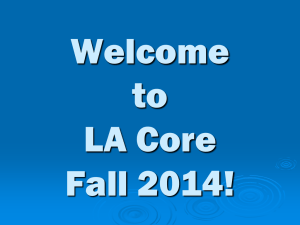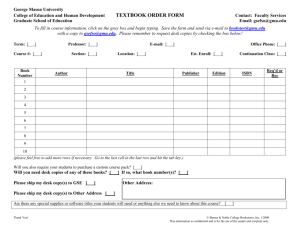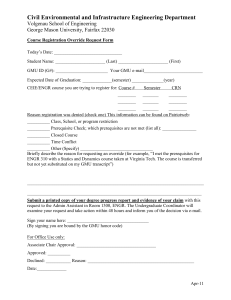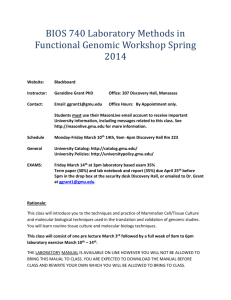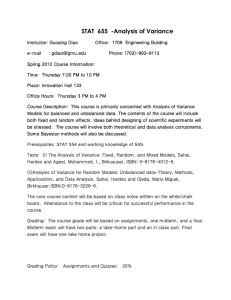Instructor: Art Taylor
advertisement
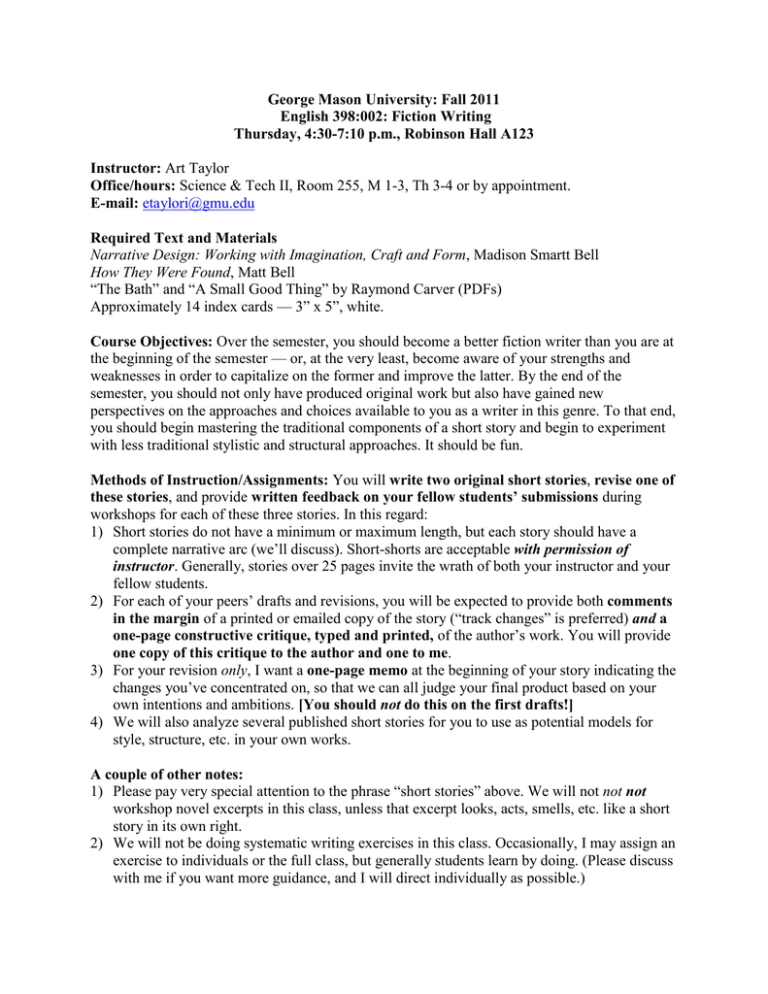
George Mason University: Fall 2011 English 398:002: Fiction Writing Thursday, 4:30-7:10 p.m., Robinson Hall A123 Instructor: Art Taylor Office/hours: Science & Tech II, Room 255, M 1-3, Th 3-4 or by appointment. E-mail: etaylori@gmu.edu Required Text and Materials Narrative Design: Working with Imagination, Craft and Form, Madison Smartt Bell How They Were Found, Matt Bell “The Bath” and “A Small Good Thing” by Raymond Carver (PDFs) Approximately 14 index cards — 3” x 5”, white. Course Objectives: Over the semester, you should become a better fiction writer than you are at the beginning of the semester — or, at the very least, become aware of your strengths and weaknesses in order to capitalize on the former and improve the latter. By the end of the semester, you should not only have produced original work but also have gained new perspectives on the approaches and choices available to you as a writer in this genre. To that end, you should begin mastering the traditional components of a short story and begin to experiment with less traditional stylistic and structural approaches. It should be fun. Methods of Instruction/Assignments: You will write two original short stories, revise one of these stories, and provide written feedback on your fellow students’ submissions during workshops for each of these three stories. In this regard: 1) Short stories do not have a minimum or maximum length, but each story should have a complete narrative arc (we’ll discuss). Short-shorts are acceptable with permission of instructor. Generally, stories over 25 pages invite the wrath of both your instructor and your fellow students. 2) For each of your peers’ drafts and revisions, you will be expected to provide both comments in the margin of a printed or emailed copy of the story (“track changes” is preferred) and a one-page constructive critique, typed and printed, of the author’s work. You will provide one copy of this critique to the author and one to me. 3) For your revision only, I want a one-page memo at the beginning of your story indicating the changes you’ve concentrated on, so that we can all judge your final product based on your own intentions and ambitions. [You should not do this on the first drafts!] 4) We will also analyze several published short stories for you to use as potential models for style, structure, etc. in your own works. A couple of other notes: 1) Please pay very special attention to the phrase “short stories” above. We will not not not workshop novel excerpts in this class, unless that excerpt looks, acts, smells, etc. like a short story in its own right. 2) We will not be doing systematic writing exercises in this class. Occasionally, I may assign an exercise to individuals or the full class, but generally students learn by doing. (Please discuss with me if you want more guidance, and I will direct individually as possible.) English 398 Syllabus/2 Workshop logistics: You will sign-up for workshop slots — one slot (and only one!) for each round; we’ll do this in class, the old-fashioned way. You will email your story to the entire class in a .doc format (NOT .docx). If your story is not ready as your date nears, you can trade your date with another student, though only to another week within the same “round.” To leave time for reading and commenting on the manuscripts prior to each class, the deadline for submissions is as follows: Monday noon deadline for Thursday workshop If your story is up for workshop, please email your submission no later than that deadline; this is a matter of respect for your fellow students’ time. Each student is responsible for reading and commenting on these stories — either printing a copy and marking it up or using “track changes” to leave comments on an electronic document. Two notes here: 1) If you are using an electronic copy, please bring your laptop to class so that you can refer to the story during workshop. We all need to be on the same page — literally so, most times. 2) I WILL PENALIZE YOUR GRADE IF YOU MISS DEADLINES! (See below.) Needless to say, these workshops are very important to the class. Late submissions: Late submissions at any stage of the process provide me the opportunity to start subtracting letter grades from your grade — one letter grade per day late. Note: per day, not per class. I do this with spectacular vengeance. Format Policy: Prose should be double-spaced with one-inch margins, in 12 pt. Times font (or one comparable to Times). Your name and course number/name (ENGH 398:002 — Fiction Workshop), a description of the assignment (“Draft I” or “Revision,” for example), the due date and a word count should be in the top left-hand corner of the first page. The title should be centered at the start of the story. PLEASE NUMBER YOUR PAGES! All writing should be free, or nearly free, of mechanical errors. The focus of this class is on style, form and content, not grammar and punctuation. The ability to competently manipulate the fundamental units of English composition — the word, the sentence and the paragraph — is a prerequisite and not a goal for this course. Attendance/class participation: You are expected to be an active participant in class — which is, incidentally, difficult if you do not attend. To that end, let me know in advance if you will be unable to meet a class; these will constitute excused absences and will be treated differently than unexcused absences. However, missing class with any regularity will damage your ability to do well in this course. Please also note that participation includes speaking, not just sitting, and while the workshop process includes offering constructive criticism of your peers’ work, you are expected to offer such criticism in a thoughtful and respectful manner. Finally: No cell phones. If one goes off in class or if I catch you texting, you lose participation credit for that day. (If mine rings, everyone present gets a bonus point for participation that day.) Quizzes: Beginning the second class of the semester, a four-question quiz will be given during the first three to five minutes of each class. Students arriving late or absent forfeit the quiz. English 398 Syllabus/3 Grading: The breakdown of your grade is as follows: Draft I .................................................................................20% Draft II ...............................................................................20% Revision .............................................................................20% Written responses for your peers .......................................20% Quizzes...............................................................................10% Class participation:.............................................................10% Note: Your ultimate grade is not based solely on an editorial assessment of your writing, nor is it based solely on whether you accomplish every item on my checklist. A student who receives an A or A- in this class must show herself or himself to be a very good writer and a very good student. The writing of an “A student” does not aim to duplicate the quality of the examples in class but does aim for the similar strengths with a sense of craft and originality. Being a good student means being in class and entering into the spirit as well as the letter of the work. Participation is important, as evidence of your engagement. Plagiarism Statement: George Mason University has an Honor Code, which requires all members of this community to maintain the highest standards of academic honesty and integrity. Cheating, plagiarism, lying, and stealing are all prohibited. The English Department’s plagiarism statement follows: “Plagiarism means using the exact words, opinions, or factual information from another person without giving the person credit. Writers give credit through accepted documentation styles, such as parenthetical citation, footnotes or endnotes; a simple listing of books and articles is not sufficient. Plagiarism is the equivalent of intellectual robbery and cannot be tolerated in an academic setting.” If I suspect you have committed plagiarism, I will submit your work to the GMU Honor Committee; you will receive an “HC” for your final grade until the case has been addressed. See honorcode.gmu.edu for more detailed information. Mason Email: Students must use their Mason email accounts—either the existing “MEMO” system or a new “MASONLIVE” account to receive important University information, including messages related to this class. See http://masonlive.gmu.edu for more information. Office of Disability Services: If you are a student with a disability and you need academic accommodations, please see me and contact the Office of Disability Services (ODS) at 9932474. All academic accommodations must be arranged through the ODS. http://ods.gmu.edu Other Useful Campus Resources: Writing Center: A114 Robinson Hall; (703) 993-1200; http://writingcenter.gmu.edu University Libraries’ “Ask a Librarian ”: http://library.gmu.edu/mudge/IM/IMRef.html Counseling and Psychological Services (CAPS): (703) 993-2380; http://caps.gmu.edu University Policies: The University Catalog, http://catalog.gmu.edu, is the central resource for university policies affecting student, faculty, and staff conduct in university academic affairs. Other policies are available at http://universitypolicy.gmu.edu/. English 398 Syllabus/4 SCHEDULE ***NOTE: THIS SCHEDULE IS SUBJECT TO CHANGE*** Important GMU dates to remember: Last day to add/drop the course (with no tuition liability).................September 6 Last day to drop the course ................................................................September 30 Selective Withdrawal period: ............................................................October 3-28 WEEK ONE September 1: Introductions, including review of syllabus. Cinderella! Read in class: “Hear That Long Train Moan” by Percival Everett (M.S. Bell, 132-136). Scramble for volunteers (sign-up). WEEK TWO: FIRST ROUND OF STUDENT STORIES!!! September 8: “Linear Design” (M.S. Bell, 25-32); “Depth Charge” by Craig Bernardini (M.S. Bell, 33-45); “Dredge,” “Mantodea,” and “The Leftover” by Matt Bell. Two student stories. WEEK THREE September 15 — No class, but still reading: “Her Ennead” and “An Index of How Our Family Was Killed” by Matt Bell. WEEK FOUR September 22: Fall for the Book: Class event with Matt Bell and Jess Walter. Meet in Sandy Spring Bank Tent, Johnson Center Plaza. Three student stories. WEEK FIVE September 29: Six student stories. WEEK SIX October 6: Six student stories. WEEK SEVEN October 13: Five student stories. WEEK EIGHT October 20: “Modular Design” (M.S. Bell, 211-216); “Signs of Life” by Miriam Kuznets and commentaries (M.S. Bell, 217-227); “The Child Downstairs” by Marcia Golub (M.S. Bell, 257263); and “Little Red” by Gilmore Tamny (Bell, 336-346). Another scramble for volunteers. WEEK NINE: SECOND ROUND OF STUDENT STORIES!!! October 27: Six student stories. WEEK TEN November 3: Six student stories. WEEK ELEVEN November 10: Six student stories. English 398 Syllabus/5 WEEK TWELVE November 17: Four student stories. PLUS: “The Bath” and “A Small Good Thing” by Raymond Carver. Sign-up for revision round. WEEK THIRTEEN November 24 — No class; Thanksgiving. WEEK FOURTEEN: REVISIONS!!! December 1: Eight student revisions (possibly in groups). WEEK FIFTEEN December 8: Instructor evaluations. Eight student revisions (possibly in groups). EXAM WEEK (Sorry….) December 15: Six student revisions (possibly in groups). PIZZA!
